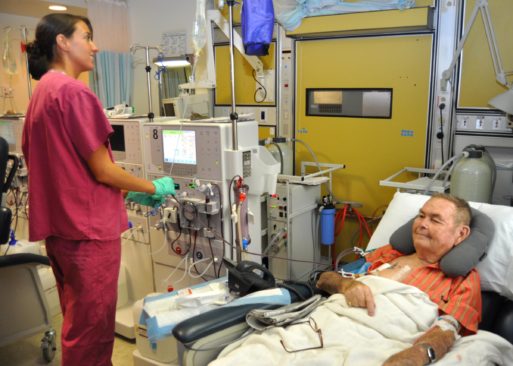End-stage renal disease is a life-limiting illness in which the kidneys are no longer functioning, or are functioning so poorly that they can no longer do their job. In the absence of a kidney transplant, people with this condition require hemodialysis — a treatment during which a machine “cleanses” excess fluid and toxins from the blood. Without it (or an alternative form of dialysis called peritoneal dialysis, which can be performed at home) most people with the condition will die within a very short time — weeks or even days. Even with ongoing dialysis, many patients succumb within five to 10 years.

A man with end-stage renal disease undergoing dialysis
Credit: U.S. Air Force by Steve Pivnick
Yet, because of a Medicare rule that says terminally ill persons can’t enter hospice while receiving “curative” care, people with end-stage renal disease face a terrible choice — forego the benefits of hospice or continue the dialysis treatments that are extending their lives. As a result, fewer than 30 percent of Americans with end-stage renal disease enter hospice at the end of their lives, according to a recent study published in JAMA Internal Medicine. By contrast, people with cancer, COPD and dementia utilize hospice at rates of 60 percent, 39 percent and 48 percent respectively.
Limited Options
To study patterns of hospice use among patients with end-stage renal disease, researchers led by Melissa Wachterman, M.D., a physician at Brigham and Women’s Hospital in Boston, looked at 770,000 Medicare claims and data from the U.S. Renal Data System. The system, a national registry that collects, analyzes and distributes information about end-stage renal disease, provided data linked specifically to individuals who had Medicare parts A and B.
What the data showed was not only that people with end-stage renal disease used hospice less often that people with other life-limiting illnesses, but that they also had much shorter hospice stays. After stopping dialysis, many of them lived only two or three days. This contrasts starkly to the average 70-day stay of the average Medicare patient receiving hospice care. (The median stay is 23 days.)
“They’re not referred to hospice…until they are within days of death — sometimes even the day of death,” said Ann O’Hare, a senior author of the study and a professor of medicine at the University of Washington School of Medicine, in a statement to Home Health Care News. “A lot of times, [they] are only offered hospice as a last resort when everything else has already been tried.”
Palliative Care — An Option Too Often Overlooked
Medicare reserves its hospice benefit for people who, according to their physicians’ best estimates, are in the final six months of life. Additionally, the patient must give up all “curative” care. (It should be noted here that dialysis does not cure renal disease.) However, there is often another option available to people with chronic and end-stage renal disease — one that is too often overlooked, and that’s palliative care. According to Get Palliative Care.org, Medicare, Medicaid and most private insurers will pay for this type of care, even if they don’t name it as such. What’s more, the National Kidney Foundation says that palliative care can benefit patients with chronic renal disease long before they reach the end of their lives.

Unlike hospice, palliative care is available to those who want to pursue curative care too
Credit: fbsbenefits.com
Unlike hospice, palliative care helps people with serious illnesses live the best life possible regardless of where in their illness trajectory they may be. It involves an interdisciplinary approach that focuses on meeting the patient’s and family’s physical, psychosocial and spiritual needs. According to the National Kidney Foundation, this may include controlling symptoms such as pain and fatigue, or treating medical issues such as high blood pressure, fluid retention and heart disease. A palliative care team can also help chronically ill persons and their caregivers deal with the stress of illness, and the depression, anxiety and other emotions that often accompany it. Most importantly, the patient can continue dialysis and other aggressive treatments while receiving palliative care.
To learn more about palliative care and to find a provider near you, visit the Provider Directory on Get Palliative Care.org.

 Patients with End-Stage Renal Disease Rarely Use Hospice
Patients with End-Stage Renal Disease Rarely Use Hospice



 The Healing Sound of Singing Bowls
The Healing Sound of Singing Bowls
 “Summons” by Aurora Levins Morales
“Summons” by Aurora Levins Morales














